Deciding on the perfect coffee machine for your business can be a difficult task. With a vast number of options and with many aspects to consider, knowing exactly what kind of machine to buy can be challenging.
At Bridge Coffee Roasters, we are constantly asked which kind of coffee machine is best. It’s a very good question, but a difficult one to answer without knowing your needs. The truth is this: there really is no one best coffee machine.
It’s important to us that you know which type of machine is best suited to your needs, even if the answer is a machine that we do not supply. The reality is that not every business needs the most modern, up-to-date coffee machine if it does not meet their specific requirements.
This article and the video below will therefore outline the most important aspects to consider when deciding on the perfect coffee machine and, in an un-biased manner, detail why certain machines are better suited to different conditions. We hope that, by reading this blog post, you’ll have a better understanding of the aspects that need to be considered when choosing the best coffee machine for you and your business.
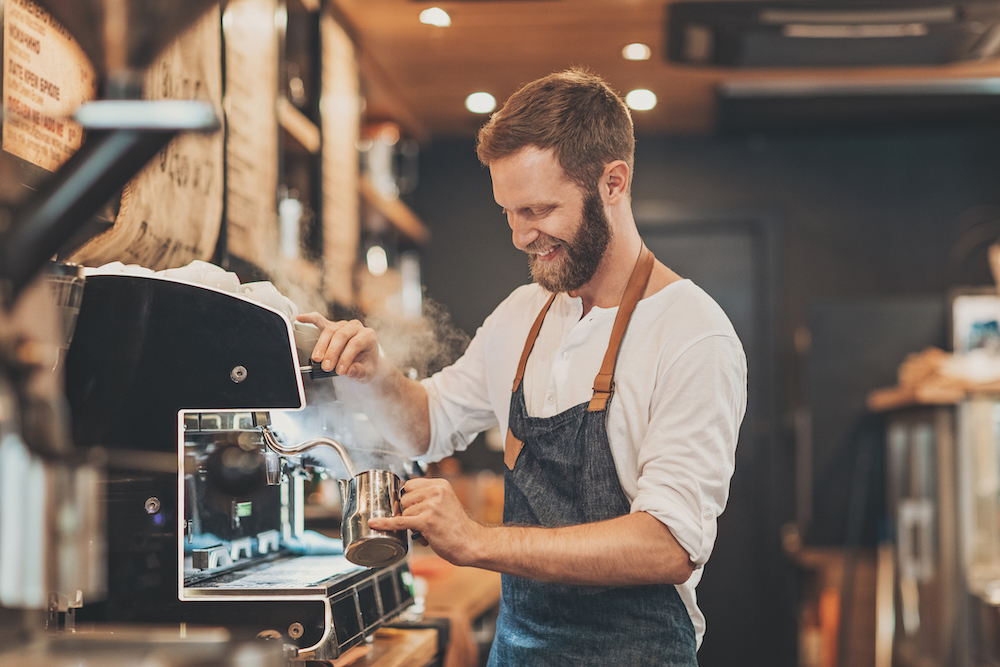

Self-Service or Trained Barista
An important question to answer that significantly affects the category of machine you may want to look at is who will be serving the coffee? From traditional espresso machines to super automatics, the person brewing the coffee makes a great impact on which type of machine to choose.
A hotel breakfast bar or office break room are likely to require the customer to use the coffee machine themselves. Here, an easy-to-use, bean-to-cup machine will be preferable, requiring minimal knowledge and involvement from the customer whilst delivering great results.
A traditional espresso machine, however, requires a certain level of training and experience which may not be suitable for every scenario, but allows a barista to interact with the customers and make constant improvements to cup-quality.
Traditional machines can make incredible results with the right training. Thankfully, we offer full SCA barista training for our customers to get the best results from their coffee and equipment.
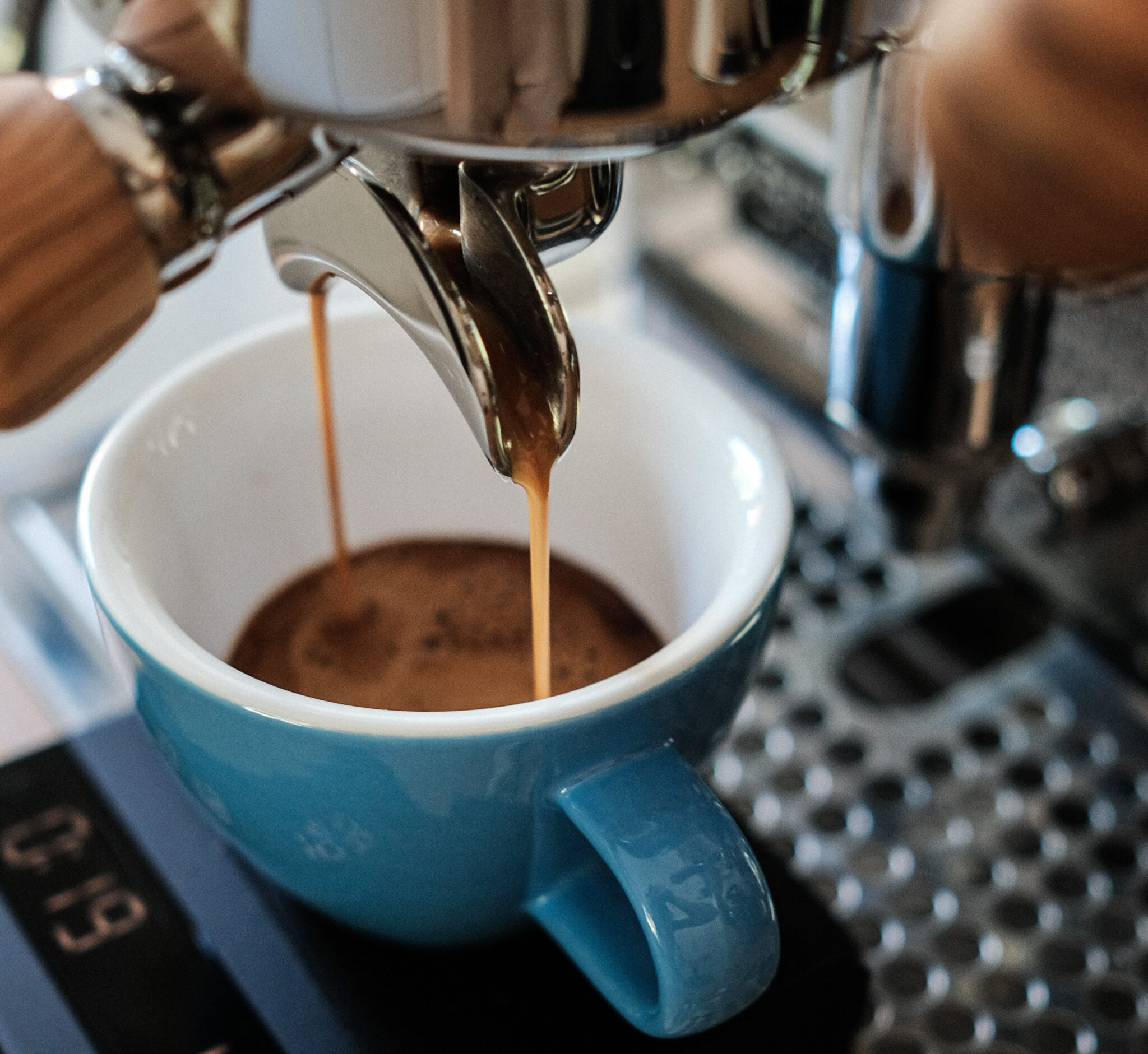

Coffee Quality
Coffee quality has been a point of contention, with many stating that the level of quality achievable with a traditional espresso machine is unrivalled by the automatic, ‘bean-to-cup’ machines.
With recent advances in technology for this category, automation can now reach the same level of quality only previously achieved by a trained barista and a traditional espresso machine. The more premium bean-to-cup machines now measure and maintain all brewing variables such as grind size, temperature and pressure to achieve high-quality, automated coffees.
However, a barista does still have an advantage over the most capable automatic machines. A trained barista, knowledgeable of the impact for each brewing variable, is able to make fast tweaks to improve cup quality, and to quickly experiment with new coffees and recipes. Super-automatic machines, though able to achieve great quality with a known coffee, are not yet able to automate the ‘dialling-in’ process of tweaking and tasting a new brewing recipe.
Looking to improve your customer service and coffee quality? Consider enrolling your staff on our SCA barista training courses.
Consistency
The importance of consistency for your specific requirements may impact the type and price of your chosen coffee machine.
Using a traditional espresso machine, and through constant tasting and tweaking, a well-trained barista can make small changes to each brewing variable to maintain consistently delicious cups of coffee.
On the other hand, typical bean-to-cup machines aim to achieve consistency by maintaining a fixed recipe. This includes many aspects of the brew process such as the dose of coffee, water, grind size and often temperature. Affordable bean-to-cup machines tend to stick to fixed recipes and do not typically measure every brewing variable, which can lead to inconsistency. For example, a bean-to-cup machine may produce wildly different coffee grind sizes depending on the temperature and humidity of its environment, even when set at the same grind setting.
The premium end of the automatic coffee machine, commonly referred to as the ‘super-automatic’ style, are able to achieve fantastic levels of consistency by measuring and controlling most brewing variables. These machines do have high up-front costs, and whether they are a good choice for your business depends on who will be serving the coffee, trained barista or otherwise, and how important consistency is to you.
Looking for consistent, high-quality coffee without the need for a barista?
Take a look at the range of super-automatic machines we have on offer here.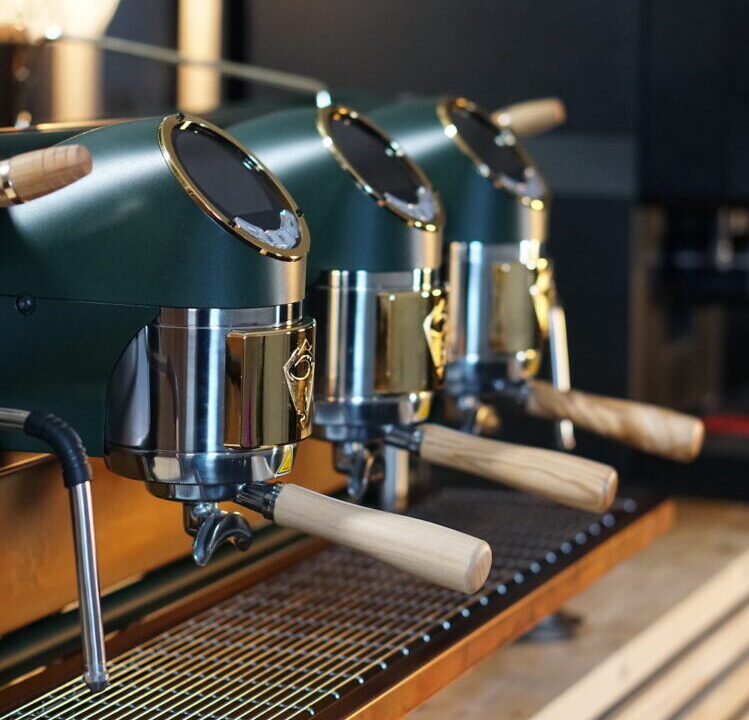

Order Volume and Capacity
When it comes to coffee machines, grinders and other brewing gear, it’s important to think about how much you’ll be asking of your equipment. This can be difficult to estimate and will always fluctuate day-to-day, but it is useful to give the wholesaler or manufacturer an idea on the demands of the equipment.
A business that predicts a very low number of coffee orders may be able to operate a basic consumer machine with no issues, whereas a busy high street café may require more of a ‘workhorse’ to reliably cope with high levels of demand.
Moreover, the volume of coffees you expect to brew directly affects the type of machine you may wish to purchase. Traditional espresso machines are available with different numbers of group heads, typically one to three, affecting how many baristas can operate the machine and the speed of making drinks.
You may also want to consider the boiler setup of your machine. A machine with just a single boiler may slow you down, as brewing espresso and milk-steaming both require the boiler to be sitting at different temperatures. Two or more boilers inside your espresso machine will allow for temperature stability, and simultaneous brewing and milk steaming. This reduces any wait time and speeding up your service.
Traditional, domestic and automatic machines all come in various levels of specification, with the more premium models typically allowing for greater speed, capacity and longevity thanks to improved technologies and materials. Whilst this ties directly with your budget, investing in quality equipment means you are less likely to run into issues down the road.
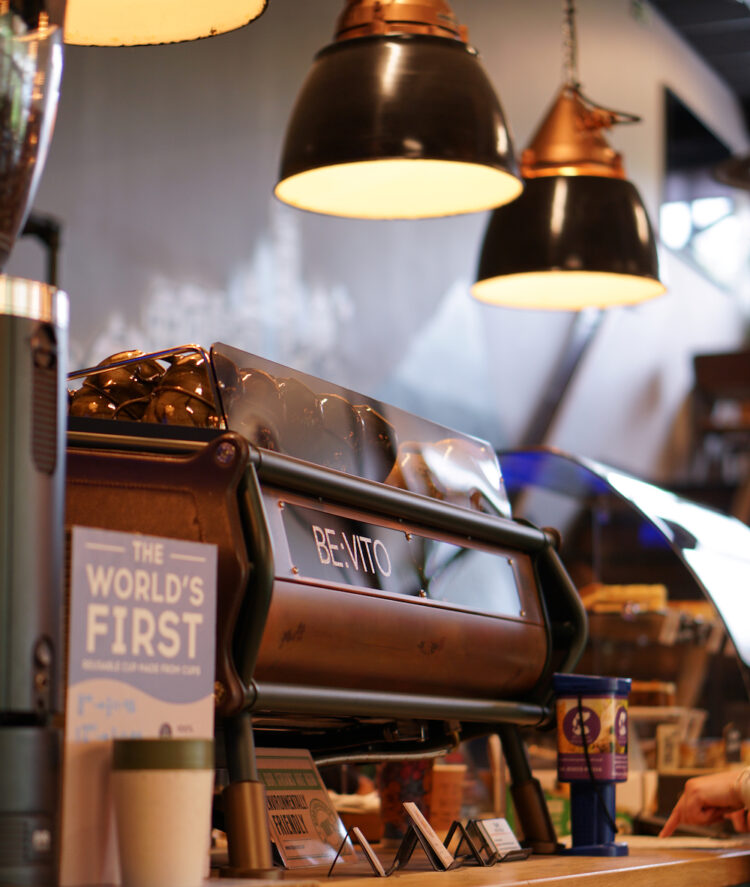

Coffee Machine Design
Likely the most fun part of the process when it comes to choosing which coffee machine to go with is deciding on the fit and finish you are looking for. Some of our favourite combinations include white or black with wooden accents, bright contrasting colours or unique designs and patterns that show off your personality.
You likely already have something in mind, and with so many different options available it is exciting to picture how your machine could look in your desired space. Thankfully, many coffee machine manufacturers allow for some level of personalisation, and this may be a key factor in deciding which machine you want to go for.
Many of our customers are proud to show off their logos and personality through customising their coffee machines. Our range of Sanremo espresso machines, for example, can be built-to-order and therefore fully customised to your liking.
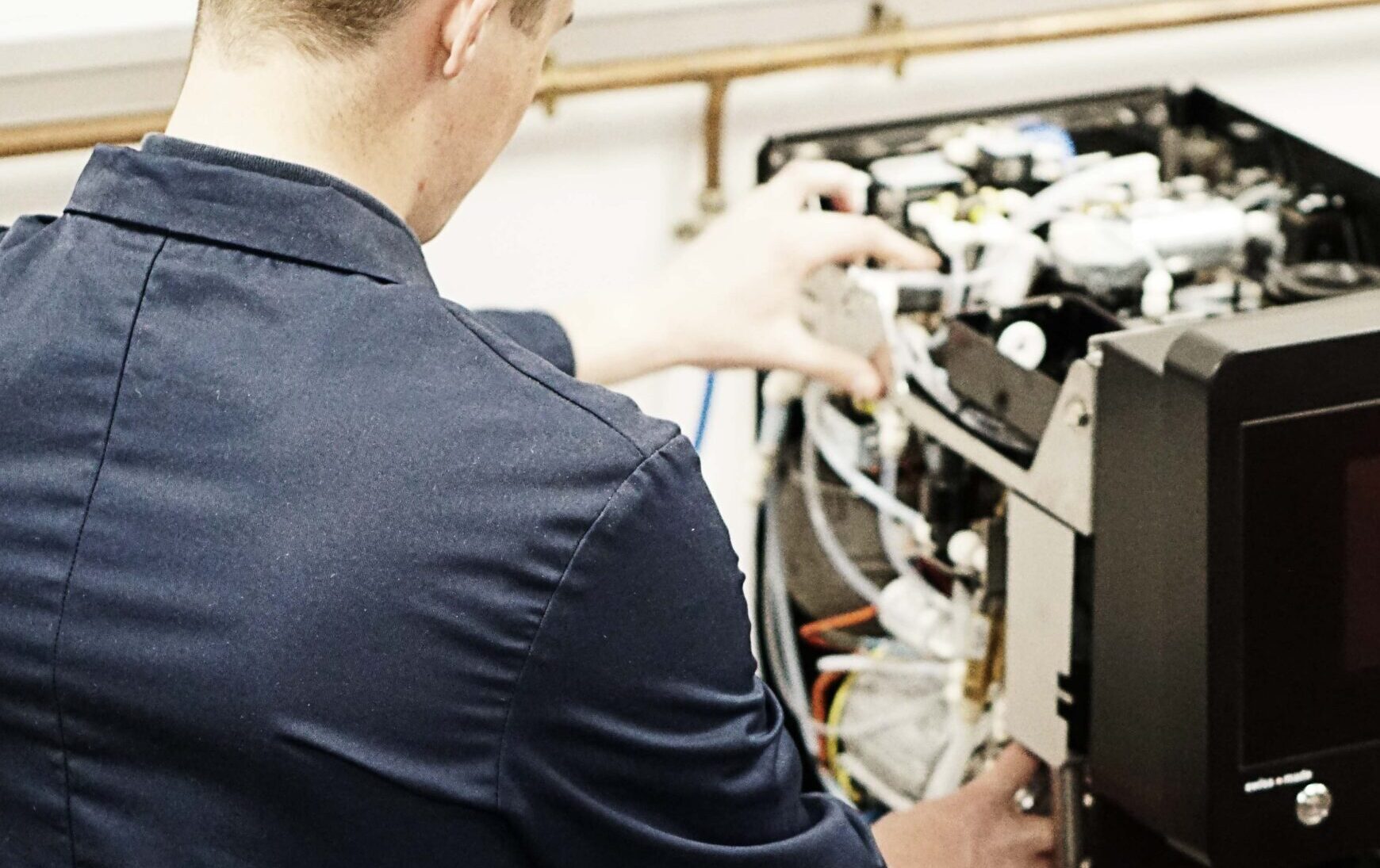

Cleaning and Maintenance of Your Equipment
How often are you able to clean your machine and have it maintained for optimal performance? Will there be a trained barista able to clean the machine throughout the day, or a member of staff able to clean, backflush and descale the machine regularly? This is an important factor to consider, as certain machines have a higher level of cleaning and maintenance required to perform properly.
Typically, traditional espresso machines are able to maintain their performance for long periods of time thanks to the care and attention of the barista. Conversely, bean-to-cup feature more moving parts and have the additional challenges of dealing with milk and spent coffee grounds. Regular cleaning is therefore crucial for these machines, and typically require more regular maintenance and servicing.
When making the final purchase decision, make sure you have a clear idea of how to regularly clean your machine, and that you know who to call when things go wrong. Purchasing your machine from a wholesaler with a reliable service and maintenance team is a great way to go, should you run into any issues. If we stock the machine you eventually decide to go with, we’d be happy to give you more information.
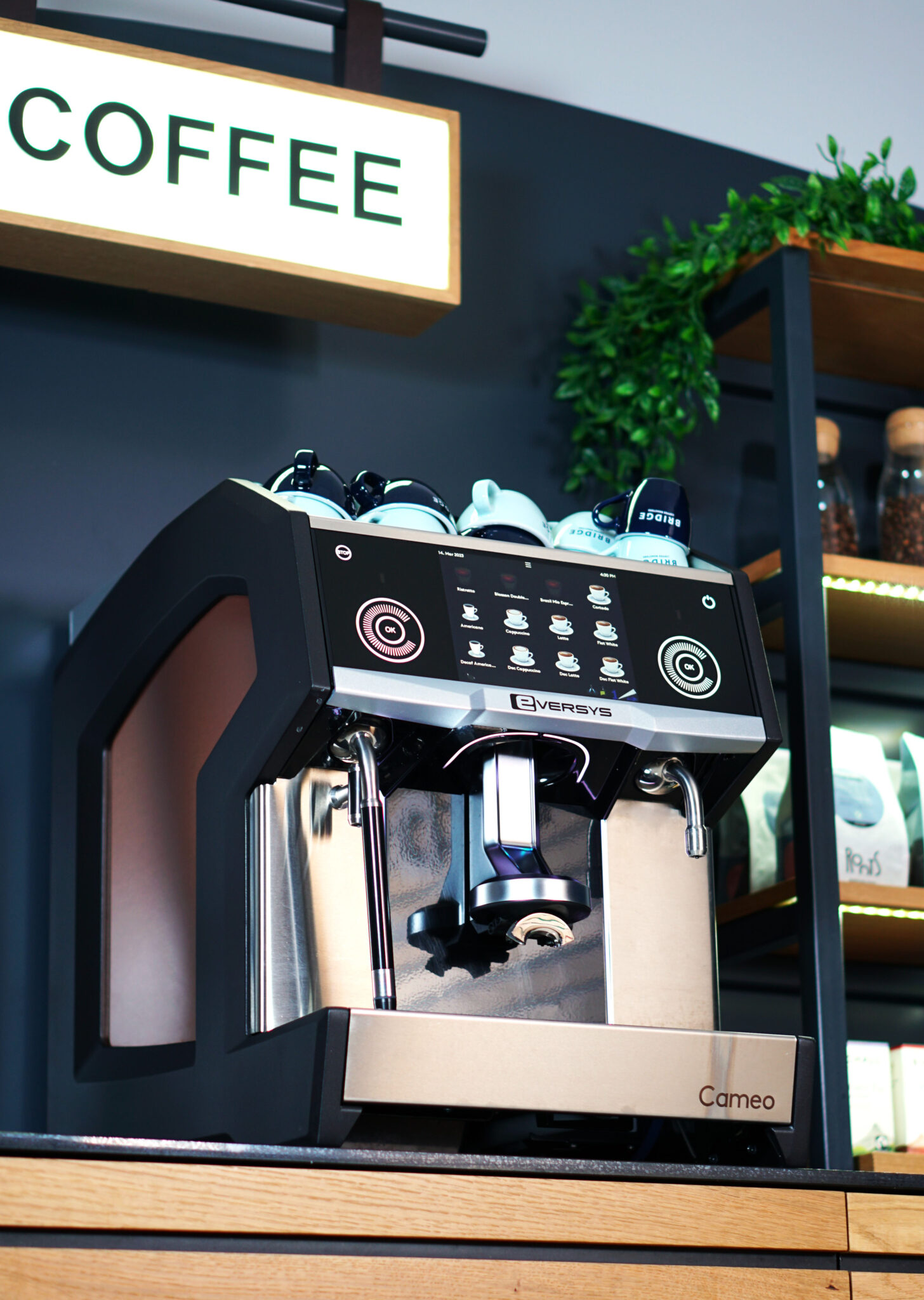

Your Budget
Now that you have an idea about the requirements of your new coffee machine, whether it be a traditional three-group espresso machine or a premium bean-to-cup machine, the last thing you’ll need to decide on is your budget.
The benefit of having so many different types of machines under many different brands is that these days, there are likely to be several coffee machines to suit your budget. Prices can vary drastically depending on additional features, the fit and finish, reliability and brand name.
An additional consideration for traditional espresso machines is the need for a separate grinders and accessories. When discussing budget with a new client, we always recommend dedicating a large proportion to the grinder, which makes an arguably greater impact on the quality of coffee you are able to produce.
If money is tight, you may be able to reconsider the additional features to save on the cost of the machine. A common mistake is to invest in a premium three-group espresso machine when in fact the volume of drinks ordered could be easily managed by a more budget-friendly two-group machine.
It is also important to consider the running cost of the machine in your final decision, including energy usage, wasteage, servicing and repairs, and staff wages. A premium automatic machine may save you money in the long run with low running costs, whilst more budget-friendly options may incur regular servicing charges.
Conclusion
If you have made it this far, you hopefully now have some idea of the many factors to consider when finding the best coffee machine for your needs.
As a neat summary, the graph below outlines the main strengths for each category and the trade-offs to expect when selecting one type of machine over another.
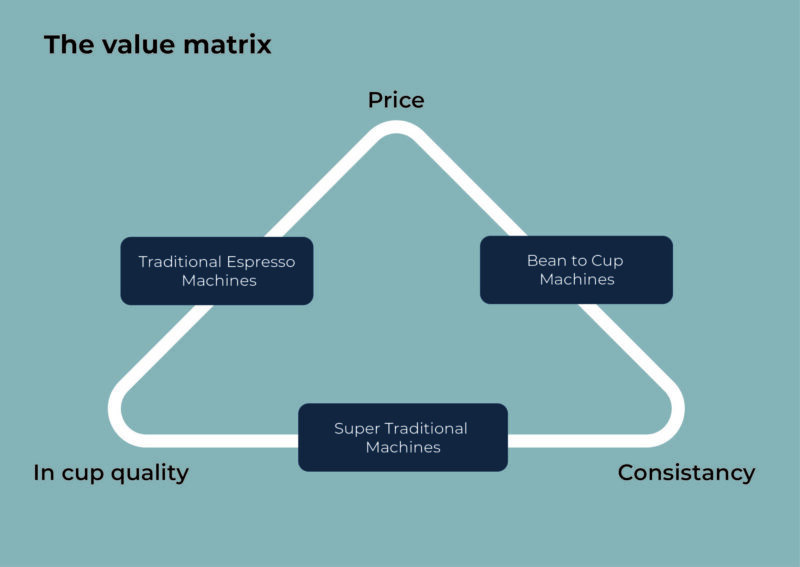

- Bean-to-cup machines, whilst consistent and affordable, do not tend to yield the highest in-cup quality for the end consumer.
- ‘Super-Traditional’ machines, such as the Eversys range, are able to produce consistent and high-quality drinks, but come at a premium price point.
- Finally, traditional espresso machines are often competitively priced and can produce incredible, high quality drinks, but are difficult to maintain when it comes to consistency. This can be mitigated with additional accessories, high quality coffee grinders and well-trained baristas, but these add another level of price to the equation.
Still Undecided?
We completely understand. There is a lot of information out there and many things to consider when selecting a coffee machine. We’re more than happy to listen to your needs and provide our recommendations, so don’t hesitate to get in touch.
Speak to the team
